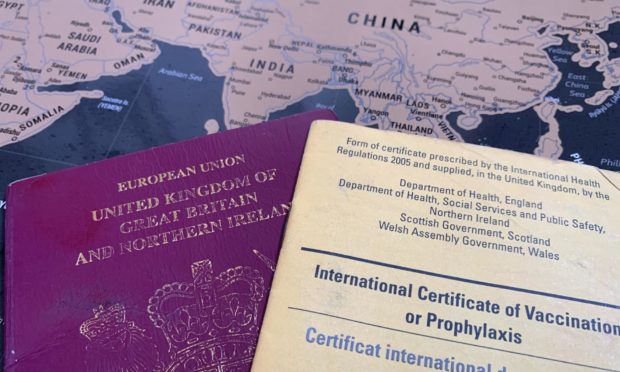All this talk of “vaccine passports” made me think about rabies injections I had before an exotic holiday in the Far East.
I was studying a medical map of the world held up by a nurse. Thailand was the focus of our attention and it was mainly coloured red – and that stood for rabies alert. It was virtually endemic, a fact of daily life, as Covid-19 is now expected to become for years ahead.
A rabies vaccine could save our lives and, at almost £300 for a course of three NHS injections for my wife and me, it seemed like money well spent.
Until we actually got there, that is – all the dogs we encountered were friendly, fat and lazy.
There was not a foaming, fang-baring mutt in sight. I wished there was – at least I could have got my money’s worth by waving a vaccinated limb at it.
I asked other travellers if they had taken any drugs recently – a daft question at some of the bars in which we found ourselves. A relative who had spent a month in Thailand every year for a decade and another chap who visited his wife’s Thai relatives regularly shrugged their shoulders and said they never had rabies jabs.
But I reasoned that the risk rose if adventurers wandered off the beaten track or let their guard down.
The really interesting thing, as far as the current debate is concerned, was that we were each given a little NHS booklet called a “vaccination record” where details about our rabies injections were recorded meticulously – like health passports.
They showed the date, drug brand and dose, and the name of the nurse who vaccinated us at our GP practice. They were next to our previous vaccinations for Hepatitis A and typhoid fever for a journey to the Caribbean. Gaps were left for others such as yellow fever and influenza.
Nothing untoward happened during that West Indies trip either, apart from one afternoon when I was snoozing on a beach after a rather enjoyable luncheon. I awoke with a start to discover a 6ft 2ins gentleman with dreadlocks massaging my toes and feet with oils. I don’t think there is any vaccine against this type of thing, so I paid him £10 to “please go away”.
I looked again at these personal health booklets the other day.
We were warned to keep them with our passports at all times. So they were obviously intended as a form of vaccine passport for official scrutiny, if necessary.
Above all, they offered peace of mind and a real sense of security if we felt vulnerable and exposed.
Why hide it?
So why are ministers giving muddled messages about issuing vaccination passports for travel or domestic use?
To my surprise, I was not given any certification when I had my first Oxford/AstraZeneca jab. After all, we have already consented to our liberties being put in a straitjacket for the time being. For example, lockdown and Covid testing, and now compulsory hotel quarantine for others, have become routine along with border checks and police interceptions.
I understand fears around “demonisation” and “discrimination”; there is apprehension about vaccine passports being mandatory in daily life, such as going to the shops or getting a job.
Many will say: “Why not?”
But if coronavirus passports come to pass, we must consider alternative Covid-test validation for those excluded – those who cannot have vaccine for medical reasons or younger people who are still awaiting their jabs.
I support libertarian arguments for free speech and movement as a general rule, but we are also fighting our biggest crisis since the Second World War. It’s not as though the state, NHS or banks do not know everything about us already. Even Netflix reminds me spookily via email what I was looking at last night on TV and asks when I will resume watching it.
I suspect vaccine passports will become as commonplace as full passports or driving licences. I would certainly feel happier with one – and knowing that strangers breathing on me had one, too.
It’s a genie which will be hard to put back in the bottle as we are swept in this direction both here and abroad anyway.
As always, the majority view and common sense must prevail.
People want to feel safe when the world opens up again. Surely this is what mass vaccination is all about – so why hide it?
